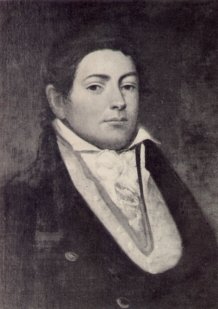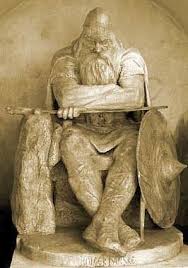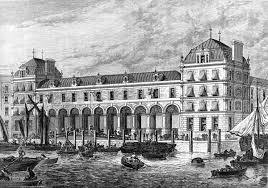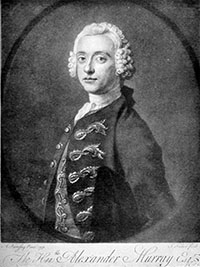
A Rogues' Gallery of baddies, no gooders and people to avoid…

Hezekiah Frith, Pirate and Privateer (1763-1848
Bermuda's "foremost privateer" of the seventeenth century had several wives. He is known to have hoarded booty from two stolen ships, kidnapped a young French woman, hid her from his wife - and stashed his wealth for his family to start a liquor store. The story goes that to this day Frith and the one of his wives haunt Inland Water (the home that he built for himself and which was subsequently rented by the dramatist Eugene O’Neill, as well as Sir Noel Coward). The fact that Eugene O’Neill had drunk himself to oblivion here with his lover Finn MacCool might suggest that it was the house itself that was cursed!
A snippet from the life of this notorious pirate: "The brig "Hezekiah", master Hezekiah Frith, did not arrive in Bermuda as expected c 1797. He and the brig were captured by the Spaniards, frigate "Juno". On release and return he published in the Gazette (Sep 2 1797): "I beg you will insert the following particulars in your Gazette, of my capture, and the treatment me and my crew received from the Spaniards in the Havannah, viz; I was taken the 5th of April last in the Gulf of Florida by the Spanish frigate "Juno" and on the 8th arrived at the Havannah with the brigs in company. I was treated on board the frigate as well as I could expect from what I had always heard of the Spaniards but my officers and men were treated badly on board the frigate. As soon as we came to anchor under Morro Castle the boats came on board and took all the prisoners off the frigate except myself and Captain Cluness of the privateer ship "Hundoston" of Jamaica which she took also three days before me. The captain of the frigate told us we should remain on board the frigate until he went to sea and he said we should be better treated than on board the prison ship or on the shore at the fort, as we, to our sorrow, soon after experienced, for, as soon as the frigate sailed we were put on board the prison ship of 80 guns in the lower gun deck, in a most filthy place more fit for a hog style then to put up Christians in, with a daily allowance of three wormy cakes of bread and three fourths of a pound of raw beef per man, which we could not get dressed unless by hiring anyone to cook it... Had it not been for the kind asistance of some masters of vessels in the harbour then in the Havannah our situation must have been more wretched if possible particularly Captain John Brownlow and Captain Christopher Lusher who both came on board and brought everything we wanted to eat and drink... "
Alexander Burnet, Archbishop of St. Andrews and Glasgow 1614-1684
Burnet was a much-feared figure who showed exceptional cruelty to those whose views disagreed with his:
"The only way to deal with a fanatic was to starve him."
The celebrated Alexander Burnet, Archbishop of St. Andrews and Glasgow was a rigorous Episcopalian who hated dissent of all kinds vehemently, and was of "blameless private life" and "absolutely honest and consistent". He was promoted to the Archbishopric of St. Andrews in 1679. Whilst at Glasgow he was also Chancellor of the University of Glasgow, a post associated with the archbishopric. Burnet's extreme views eventually forced the King to demand his resignation.
Burnet was born in Edinburgh in 1615 - his father was also a churchman, but his grandfather, William Burnet, was a notorious border raider nicknamed Hoolet o'Barns (it is ironic that several of his sons were associated with the law, but on the right side of it!). Having graduated Burnet went to work in the household of the 1st Earl of Traquair. Traquair, like Burnet, was an ardent Royalist.
Initially Burnet's episcopalian views were not in favour in Scotland, and he went to work in England, where he was ordained. During the Commonwealth he was ejected and went to live on the continent, where he acted as a courier for Charles II. He returned at the Restoration, and became Rector of Ivychurch in Kent; eventually he returned to Scotland where he initially became Bishop of Aberdeen, then Archbishop of Glasgow shortly afterwards. Immediately Burnet became embroiled in the politics of the church, where he took the extreme and rigid stance against dissenters to the national church that he is best known for.
Burnet's feeling towards Presbyterians is stated to have been expressed in this sentence : "The only way to deal with a fanatic was to starve him."
Among his earliest acts was to summon James Hamilton of Aitkenhead, in Cathcart parish, before the High Commission Court for failing to attend the church; and under this and a number of other charges, for the most part believed to have been trumped up, Aitkenhead had to pay heavy fines, and suffer several periods of imprisonment. On the 18th December, 1664, John Spreul, the late town-clerk of Glasgow, was, by an Act of the Privy Council, banished the country for his Presbyterianism; while George Porterfield and John Graham, late provosts of the city, were similarly dealt with in 1665.
The Town Council, on the 22nd April, 1665, ordered the inhabitants of the city to bring their arms to the magistrates, to be kept in the Tolbooth, and those who failed to obey this disarming Act were to be held as disaffected. In his zeal for the advancement of Episcopacy, Burnet informed the city authorities that he intended to employ the King’s militia to collect certain fines which had been imposed for nonconformity; but the Council thought it better to do so. Burnet protested so much and so publicly about this “generosity” to Presbyterians, that he was sacked by order of the king.
After the Restoration of Charles II in 1660, bishops and the selection of ministers by patrons rather than by congregations were again imposed. Ministers who would not accept this were ousted and often took large sections of their congregations with them. These would often be forced to meet in the open air in conventicles. Conventicles were being reported in Glasgow in the late 1670s. In October 1678 Archbishop Alexander Burnet was attacked by a conventicle, including "great multitudes of women", which had been meeting in the Saltmarket. In 1679, after the victory of Covenanters at Drumclog, troops entered Glasgow, but were repelled by government forces in the streets around Glasgow Cross. The suppression of Covenanters continued in the early 1680s, during what were known as the "killing times", with various executions in Glasgow in 1684, including five at Glasgow Cross on 19 March.
According to some Burnet was eventually assassinated, but this view is not universally held. Certainly, in as much as he was held in great respect and affection by some, he was loathed and detested by others and his extreme vindictiveness towards anyone who took opposing views is not in question. Correspondence exists describing him as Longifacies and Long Nez (long nose).
Eystein “The Fart”, King of Raumarike (died 750)
An everyday story of looting and plunder from the eighth century…
…The father and son, Halfdan and Eystein, then took possession of the whole of Westfold, which Eystein ruled over as long as he lived. At that time there lived at Varna a king called Skjold, who was a great warlock. King Eystein went with some ships of war to Varna, plundered there, and carried away all he could find of clothes or other valuables, and of peasants' stock, and killed cattle on the strand for provision, and then went off.
King Skjold came to the strand with his army, just as Eystein was at such a distance over the fjord that King Skjold could only see his sails. Then he took his cloak,waved it, and blew into it.
King Eystein was sitting at the helm as they sailed in past Jarls, and another ship was sailing at the side of his, when there came a stroke of a wave, by which the boom of the other ship struck the king and threw him overboard, which proved his death.
"King Eystein sat upon the poop
Of his good ship: with sudden swoop
The swinging boom dashed him to hell,
And fathoms deep the hero fell
Beneath the brine. The fury whirl
Of Loke, Tempest's brother's girl,
Grim Hel, clutched his soul away;
And now where Vodle's ocean bay
Receives the ice-cold stream, the grave
Of Eystein stands -- the good, the brave!"
...so writes Thjodolf
His men fished up his body, and it was carried into Borre, where a mound was thrown up over it, out towards the sea at Raden, near Vodle.
Eystein’s grandfather, King Ingiald of Sweden, was known as “Ill-Ruler” and “Evilheart”; Eystein’s father Olaf was a “Tree-Hewer”. Clearly blood and guts ran through all their veins!
Michael Hurlock, "Cutaway Mike" (1765-1846)
Cutaway Mike: the name comes from his job, which was to police the Thames; if boats had not paid their mooring fees, Mike's job was to cut the ropes which held the boats to their mooring. "Cutaway Mike" became a thing of legend, and he was immortalized in the famous ballad of that name. This is the text used over a hundred years later by the Sussex folksinger George Spicer:
Cutaway Mike
Little Mike he was born about six in the morn,
Sure he and his mother were there at the time.
Now, well I'm a-singing, pray don't you be scorning,
For all his adventures I'll tell in my rhyme.
Chorus:
With a rub-a-dub, rowdy-dow, fife-away, all-the-day,
Fill-a-loo, that'll-do, cut away Mike.
He once took a walk to his grandfather Tower,
Who lived about six hundred miles out of town.
Got there in an hour, then lifted a tower,
And returned home again with a church in his lap.
He once made a contract with baker and butcher,
For all they could bake and for all they could kill.
A whole batch of bread he consumed for his dinner
Then stuck a cow's tail in the hole of his tooth.
Spoken: (Laughs) Don't know no more.
Alexander Murray 1712-1778
The firebrand Alexander Murray developed into a well-known and vehement Jacobite, and refused to kneel to the House of Commons, refusing to accept the union of Scotland and England. He was a part of the most recent plot against the royal family. He probably should not be in a rogues' gallery, although the English would no doubt have put him there! Other members of his family like his brother General James Murray who was making his progress in the British army and would succeed eventually in being made Governor of Quebec and Canada, were doubtless also worried that a family member so against the new order might impede their chances of success.
"Mr Alexander Murray was so enthusiastic a Jacobite as to propose leading an insurrection even after the close of all the just hopes of the house of Stuart in 1746. He was confined for more than a year (Newgate Jail - see image} subsequent to May 1750, by order of the house of commons, for violent interference with a Westminster election; and, as he refused to express contrition on his knees, according to the order of the house, he might have been confined for a much longer period, if the prorogation of parliament had not brought about his enlargement".
The Elibank Plot and Alexander Murray:
... Charles Edward [the Young Pretender] did not give up. He tried to persuade Louis XV to go to war again. Lochiel urged for another invasion in 1747 a year before his death in Flanders. There were other Jacobite plots later but none succeeded. The last Jacobite to be executed was Dr Archibald Cameron, Lochiel's brother, after Alexander Murray's Elibank Plot to abduct or assassinate the whole royal family was exposed by young MacDonell of Glengarry (the spy code named 'Pickle') in 1753. When George III succeeded his grandfather as King in 1760 he was accepted in a way his predecessors had not been. Unlike them - and unlike Charles Edward - he had even been born in Britain. The Old Pretender, James Francis, died in 1766. Charles Edward started calling himself Charles III but this meant little. He died in 1788 a disappointed drunkard. His younger brother Henry became a Cardinal. As Henry IX he died in 1807, recognising George III and his descendants as the lawful kings.





.jpg)